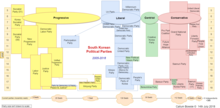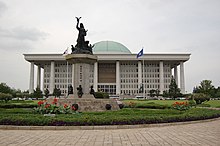Politics of South Korea
The politics of South Korea take place in the framework of a presidential representative democratic republic, whereby the president is the head of state, and of a multi-party system.
To ensure a separation of powers, the Republic of Korea Government is made up of three branches: legislative, executive, and judicial.
From its founding until the June Democratic Struggle, the South Korean political system operated under a military authoritarian regime, with the freedom of assembly, association, expression, press and religion as well as civil society activism being tightly restricted.
During that period, there were no freely elected national leaders, political opposition is suppressed, dissent was not permitted and civil rights were curtailed.
[1][needs update] According to the V-Dem Democracy indices in 2023, South Korea was the third most electoral democratic country in Asia.
[2] South Korea is often cited as a model of democracy due to its relatively peaceful and internally-driven democratic transition.
[12][13] These changes have largely attributed to South Korea's weak political party structure that emphasizes leaders and, consequently, hyper-presidentialism.
[14][15][16] However, South Korea is considered to have a strong civil society or simin sahoe manifested through a large number of civic organizations that prevented further backsliding via the 2016-2017 Candlelight Demonstrations.
[17][14] Under more recent administrations such as President Yoon Suk Yeol, South Korea has taken a stance as a "Global Pivotal State," which involves a greater role in East Asia as a democratic power.


